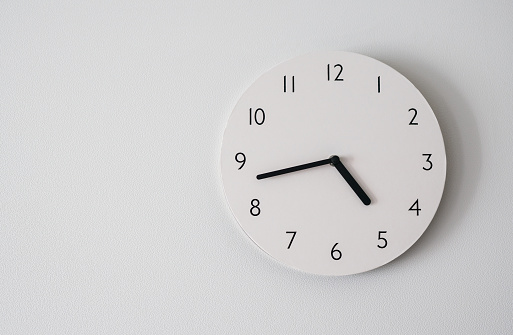Are you wondering how to stop a clock from ticking? There are many ways to stop a clock from ticking. Keep reading!
How To Stop A Clock From Ticking

There are many ways to stop a clock from ticking. The most common way is to oil the mechanism. Clock oil is available at any hardware store. Alarm clocks and pendulum clocks need to be oiled more often than digital clocks. If you have a noisy clock, first, you can try oiling the clock’s mechanism. If the clock is still loud, you may need to replace the entire clock.
The second way to stop a clock from ticking is to use packing tape. Packing tape can be used to silence a loud ticking clock. Simply place a piece of tape over the ticking sound. The only drawback to using packing tape is that it will not silence an alarm clock.
The third way to stop a clock from ticking is to use a mason jar. Mason jars can be used to silence small clocks. Simply place the clock in the jar and seal it with a lid. The fourth way to stop a clock from ticking is to use foam padding. Foam padding can be used to silence larger clocks. Another way is to use mains frequency noise. You can also use an existing clock’s mechanism housing. Finally, you can use a non-ticking clock.
A battery-powered pulsed electromagnet is a device that uses a magnetic field to move or vibrate an object. This can be used to create a variety of effects, from the simple ticking of a clock to the more complex movement of a vehicle. The electromagnet is usually housed in a mechanism box, and all the tips and tricks for creating different effects are packed into this one little package.
To create a ticking sound, for example, you would need a clock, the clock’s hands, and something for the clock to depend on for its ticking noise (such as laminated glass or a mason jar). The clock would be placed open on the table, with the big clock face down and the tiny coil head facing up. You would then place smaller clocks around the big clock, with their hands and their faces pointing towards the big clock’s face. Once you have excess oil on the clocks, you can start the pulsed motor by connecting it to a single AA battery. The only drawback of this method is that it can be quite loud, so you may want to use packing tape to muffle the sound.
Ticking Sound
The tick-tock sound coming from your clock can be annoying, especially if you have a lot of them in your room or house. There are several ways to make a clock quieter. You can add mass to the pendulum, which will absorb some of the energy and make the clock tick more slowly. You can also oil the gears, which will reduce friction and make the clock run smoother. The simplest solution is to put the clock in a quiet place, away from any walls or other objects that might amplify the clock ticking or loud ticking noise. There are many modern clocks on the market that are designed to be silent or have a very quiet ticking sound.
Clock Oil

Clock oil is a special type of oil that is used to lubricate the Clock’s mechanisms. It is also used to clean and protect the Clock from rust and corrosion. The Clock’s mechanism is made up of small gears that must be lubricated to function properly. Without Clock oil, the Clock would not be able to keep accurate time. The Clock’s ticking noise is caused by the Clock’s gears as they rotate. The ticking noise can be annoying, especially if you are trying to sleep.
The best way to reduce the ticking noise is to add Clock oil to the Clock’s mechanism. This will lubricate the gears and allow them to rotate smoothly. To oil a clock, you will need to remove the clock’s hands and open the mechanism box. Once the box is open, you can apply a small amount of oil to the gears and other moving parts. It is important not to use excess oil, as this can cause the clock to run slower. Once you have applied the oil, you can replace the hands and close the mechanism box. This method works like magic!
Wall Clock

Wall clocks are usually made with tempered glass to help protect against accidental breakage. If you have a mechanical wall clock, it is important to oil the clock’s mechanism regularly to keep it running smoothly.
Wall clocks are a common sight in homes and offices, but they can be quite a nuisance if they make a lot of noise. If you have a ticking wall clock, there are several things you can do to make it quieter. The simplest solution is to add a bit of oil to the clock’s mechanism. This will help to lubricate the gears and reduce the ticking sound. If your clock is particularly loud, you may also want to add some extra mass to the mechanism housing. This will help to absorb the sound and make the clock run more smoothly. Finally, if you have an expensive model, you may want to take it to a clockmaker to have the gears adjusted. This will add tension and make the clock run more quietly. With a little effort, you can find the perfect balance between style and function for your wall clock.
Loud Ticking Clock
If you’re looking for a way to add tension, the simplest solution is to add a loud ticking sound. This can be done with a pet, keeping ultra-small, expensive models with gears and excess oil, or a second hand. If you want to add extra mass, you can use a wall clock or a tiny coil. Tempered glass can help to make the clock’s motor run smoother and quieter in a quiet place. If you have a modern clock, you can use digital clocks to make the loud-ticking clock quieter. If you have a cheap clock, you can try adding mass to the mechanism box to make the loud ticking less. You can also use all the tips above to help make your clock tick less loudly. A clock face is an important factor that will affect how your clock runs. A big clock will usually have louder ticking sounds while smaller clocks tend to tick more quietly.
Conclusion
One way to stop a clock from ticking is to use packing tape. This will dampen the sound and help to reduce the noise. If you have an alarm clock, you can also use a battery-powered pulsed electromagnet. This will emit a noise that will cancel out the ticking sound. If you have a wall clock, you can also use a tempered glass panel. This will reflect the sound and help to reduce the noise. If you have a pendulum clock, you can use a mason jar. If you have a digital clock, you can also use foam padding.







